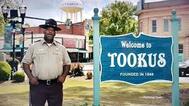weekly column
|
Each week, find a commentary on something connected to verses of Torah or another source of wisdom
|
|
Each week, find a commentary on something connected to verses of Torah or another source of wisdom
|
 The Numbers:13 Project Those are the Waters of Meribah—meaning that the Israelites quarrelled with the LORD—through which He affirmed His sanctity. Numbers 20:13 There is a product for treating hemorrhoids that runs television advertisements about places named “Kiester” and “Tookus.” Those are truly awful names for cities, even if, as I suspect, some very lovely people make their homes there. Arizona indeed has a city named Tombstone. Pennsylvania boasts a turnpike exit for Intercourse. And in North Carolina, you can vacation in Kill Devil Hills. There is a story behind each name, likely less sensational than modern associations. But they are certainly associated with an event, a person or a characteristic that had lasting resonance for the original residents. Mostly, we inherit the names of places. There are suburbs and neighborhoods that are newly designated as populations shift, but whether a place is named for an idea (Philadelphia), a person (Washington), a topographical feature (Cedar Rapids) or we-ran-out-of-creativity (Centerville), eventually the resonance of the name is replaced by the experiences of the inhabitants. A colleague of mine (forgive me for forgetting who) offered me a ritual for a family preparing to leave a longtime home. She suggested standing in each room with them and asking them to share a memory of being in that room. I have employed it to great effect many times. Simply naming the moment allows it to enjoy renewed life. The living room is alive once more. The kitchen offers one last nourishing meal. The bedroom releases the dreams that filled it. And then it is time for someone else to create a legacy. There are lots of such places in my life. I have called eleven different cities home and not one of them was named by me or for me. (Believe it or not, I have never been to Moline, Illinois. Or Jack, Virginia, for that matter.) But each one resonates in an important way. In one I learned to ride a bike. In another I went to college. In a third I became a father. In yet another I grew old. Collectively, we have been reassociating the names of our cities in dark and distressing ways. Columbine, Charlottesville, El Paso, Dayton. These are places with rich histories and cultures, where kids learned to ride bikes, students went to university, couples became parents. They are places people expected to grow old. Now, involuntarily, they have become shorthand for a national quarrel. Without anyone vacating, a new legacy has been created. There is an interpretive version of the Mourner’s Kaddish, a prayer recited by the bereaved, that has become a part of some versions of the Martyrology, a painful retrospective included in the long afternoon of the Yom Kippur liturgy. Interspersed among the Aramaic phrases are the names of places that have become associated with Jewish catastrophic loss. It is hard to acknowledge that kids learned to ride bikes in Auschwitz, students went to learn in Vilna and Warsaw, young couples became parents in Babi Yar and Birkenau. People still grow old in Maidanek. Lots of people, places and things get named in the Bible. And often they are associated with stories meant to explain their origins. “Mei Merivah,” the Waters of Meribah, the Contentious Waters may very well have been an oasis before the quarrels among the people and their leaders and their God gave them that name. Perhaps they were always called “Meribah,” because people would come there to resolve their disputes, or because they came from a cleft (“riv”) in the rock, or because they were named after the guy who discovered them, Murray Meribah. We need to be very careful about the associations we create with the places we live. Real people live in Kiester and Tookus, in Philadelphia and Centerville, In Columbine and El Paso. They want to mark the milestones of their lives on their own terms and live into the happy legacies that they deserve. Let’s make sure nobody shoots them up.
0 Comments
Leave a Reply. |
Archives
October 2023
Categories |